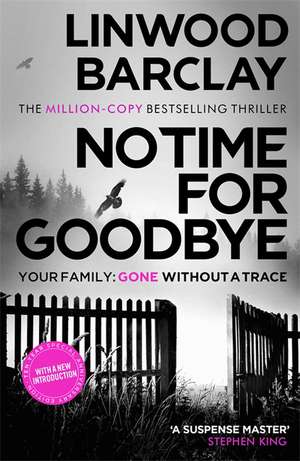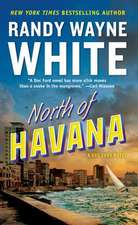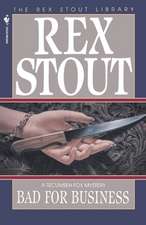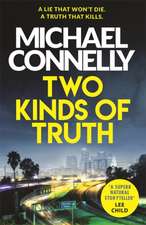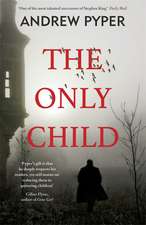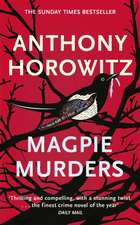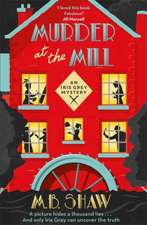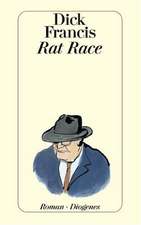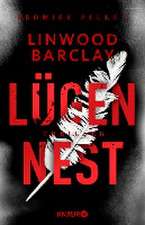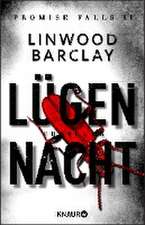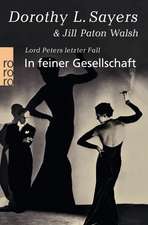No Time For Goodbye
Autor Linwood Barclayen Limba Engleză Paperback – 31 mai 2018
| Toate formatele și edițiile | Preț | Express |
|---|---|---|
| Paperback (2) | 50.89 lei 3-5 săpt. | +28.40 lei 6-12 zile |
| Orion Publishing Group – 31 mai 2018 | 50.89 lei 3-5 săpt. | +28.40 lei 6-12 zile |
| Bantam – 31 iul 2008 | 57.30 lei 3-5 săpt. |
Preț: 50.89 lei
Preț vechi: 64.95 lei
-22% Nou
Puncte Express: 76
Preț estimativ în valută:
9.74€ • 10.13$ • 8.16£
9.74€ • 10.13$ • 8.16£
Carte disponibilă
Livrare economică 20 februarie-06 martie
Livrare express 05-11 februarie pentru 38.39 lei
Preluare comenzi: 021 569.72.76
Specificații
ISBN-13: 9781409180852
ISBN-10: 1409180859
Pagini: 496
Dimensiuni: 128 x 198 x 34 mm
Greutate: 0.35 kg
Editura: Orion Publishing Group
ISBN-10: 1409180859
Pagini: 496
Dimensiuni: 128 x 198 x 34 mm
Greutate: 0.35 kg
Editura: Orion Publishing Group
Notă biografică
Linwood Barclay is a columnist for the Toronto Star. He is the author of several critically acclaimed novels, including Stone Rain and Lone Wolf. He lives near Toronto with his wife and has two grown children.
From the Hardcover edition.
From the Hardcover edition.
Extras
Chapter One
Cynthia stood out front of the two-story house on Hickory. It wasn't as though she was seeing her childhood home for the first time in nearly twenty-five years. She still lived in Milford. She'd driven by here once in a while. She showed me the house once before we got married, a quick drive-by. "There it is," she said, and kept on going. She rarely stopped. And if she did, she didn't get out. She'd never stood on the sidewalk and stared at the place.
And it had certainly been a very long time since she'd stepped through that front door.
She was rooted to the sidewalk, seemingly unable to take even one step toward the place. I wanted to go to her side, walk her to the door. It was only a thirty-foot driveway, but it stretched a quarter century into the past. I was guessing, to Cynthia, it must have been like looking through the wrong end of some binoculars. You could walk all day and never get there.
But I stayed where I was, on the other side of the street, looking at her back, at her short red hair. I had my orders.
Cynthia stood there, as though waiting for permission to approach. And then it came.
"Okay, Mrs. Archer? Start walking toward the house. Not too fast. Kind of hesitant, you know, like it's the first time you've gone inside since you were fourteen years old."
Cynthia glanced over her shoulder at a woman in jeans and sneakers, her ponytail pulled down and through the opening at the back of her ball cap. She was one of three assistant producers. "This is the first time," Cynthia said.
"Yeah yeah, don't look at me," Ponytail Girl said. "Just look at the house and start walking up the drive, thinking back to that time, twenty-five years ago, when it all happened, okay?"
Cynthia glanced across the street at me, made a face, and I smiled back weakly, a kind of mutual what-are-you-gonna-do?
And so she started up the driveway, slowly. If the camera hadn't been on, is this how she would have approached? With this mixture of deliberation and apprehension? Probably. But now it felt false, forced.
But as she mounted the steps to the door, reached out with her hand, I could just make out the trembling. An honest emotion, which meant, I guessed, that the camera would fail to catch it.
She had her hand on the knob, turned it, was about to push the door open, when Ponytail Girl shouted, "Okay! Good! Just hold it there!" Then, to her cameraman, "Okay, let's set up inside, get her coming in."
"You're fucking kidding me," I said, loud enough for the crew—a half dozen or so, plus Paula Malloy, she of the gleaming teeth and Donna Karan suits, who was doing all the on-camera stuff and voiceovers—to hear.
Paula herself came over to see me.
"Mr. Archer," she said, reaching out with both hands and touching me just below my shoulders, a Malloy trademark, "is everything okay?"
"How can you do that to her?" I said. "My wife's walking in there for the first time since her family fucking vanished, and you basically yell 'Cut'?"
"Terry," she said, insinuating herself closer to me. "May I call you Terry?"
I said nothing.
"Terry, I'm sorry, we have to get the camera in position, and we want the look on Cynthia's face, when she comes into the house after all these years, we want that to be genuine. We want this to be honest. I think that's what both of you want as well."
That was a good one. That a reporter from the TV news/entertainment show Deadline—which, when it wasn't revisiting bizarre _unsolved crimes from years past, was chasing after the latest drinking-and-driving celebrity, or hunting down a pop star who'd failed to buckle her toddler into a seat belt—would play the honesty card.
"Sure," I said tiredly, thinking of the bigger picture here, that maybe after all these years, some TV exposure might finally provide Cynthia with some answers. "Sure, whatever."
Paula showed some perfect teeth and went briskly back across the street, her high heels clicking along the pavement.
I'd been doing my best to stay out of the way since Cynthia and I'd arrived here. I'd arranged to get the day off from school. My principal and longtime friend, Rolly Carruthers, knew how important it was to Cynthia to do this show, and he'd arranged a substitute teacher to take my English and creative writing classes. Cynthia had taken the day off from Pamela's, the dress shop where she worked. We'd dropped off our eight-year-old daughter, Grace, at school along the way. Grace would have been intrigued, watching a film crew do its thing, but her introduction to TV production was not going to be a segment on her own mother's personal tragedy.
The people who lived in the house now, a retired couple who'd moved down here from Hartford a decade ago to be close to their boat in the Milford harbor, had been paid off by the producers to clear out for the day so they could have the run of the place. Then the crew had gone about removing distracting knickknacks and personal photos from the walls, trying to make the house look, if not the way it looked when Cynthia lived there, at least as generic as possible.
Before the owners took off for a day of sailing, they'd said a few things on the front lawn for the cameras.
Husband: "It's hard to imagine, what might have happened here, in this house, back then. You wonder, were they all cut up into bits in the basement or something?"
Wife: "Sometimes, I think I hear voices, you know? Like the ghosts of them are still walking around the house. I'll be sitting at the kitchen table, and I get this chill, like maybe the mother or the father, or the boy, has walked past."
Husband: "We didn't even know, when we bought the house, what had happened here. Someone else had got it from the girl, and they sold it to someone else, and then we bought it from them, but when I found what happened here, I read up on it at the Milford library, and you have to wonder, how come she was spared? Huh? It seems a bit odd, don't you think?"
Cynthia, watching this from around the corner of one of the show's trucks, shouted, "Excuse me? What's that supposed to mean?"
One of the crew whirled around, said, "Shush," but Cynthia would have none of it. "Don't you fucking shush me," she said. To the husband, she called out, "What are you implying?"
The man looked over, startled. He must have had no idea that the person he was talking about was actually present. The ponytail producer took Cynthia by the elbow and ushered her gently, but firmly, around the back of the truck.
"What kind of horseshit is that?" Cynthia asked. "What's he trying to say? That I had something to do with my family's disappearance? I've put up with that shit for so—"
"Don't worry about him," the producer said.
"You said the whole point of doing this was to help me," Cynthia said. "To help me find out what happened to them. That's the only reason I agreed to do this. Are you going to run that? What he said? What are people going to think when they hear him saying that?"
"Don't worry about it," the producer assured her. "We're not going to use that."
They must have been scared Cynthia was going to walk at that point, before they had even a minute of her on film, so there were plenty of reassurances, cajoling, promises that once this piece went on TV, for sure someone who knew something would see it. Happened all the time, they said. They'd closed cold cases for the cops all over the country, they said.
Once they had again persuaded Cynthia that their intentions were honorable, and the old farts who lived in the house had been whisked away, the show went on.
I followed two cameramen into the house, then got out of the way as they positioned themselves to catch Cynthia's expressions of apprehension and deja vu from different angles. I figured that once this was on TV, there'd be lots of fast editing, maybe they'd turn the image all grainy, dig around in their bag of tricks to bring more drama to an event that TV producers in decades past would have found plenty dramatic on its own.
They led Cynthia upstairs to her old bedroom. She looked numb. They wanted footage of her walking into it, but Cynthia had to do it twice. The first time, the cameraman was waiting inside her bedroom, the door closed, to get a shot of Cynthia entering the room, ever so tentatively. Then they did it again, this time from the hall, the camera looking over her shoulder as she went into the room. When it aired, you could see they'd used some fish-eye lens or something to make the scene spookier, like maybe we were going to find Jason in a goalie mask hiding behind the door.
Paula Malloy, who'd started out as a weather girl, got her makeup retouched and her blond hair repouffed. Then she and Cynthia had those little microphone packs attached to the backs of their skirts, the wires run up and under their blouses and clipped just below their collars. Paula let her shoulder rub up against Cynthia's, like they were old friends reminiscing, reluctantly, about the bad times instead of the good.
As they came into the kitchen, cameras rolling, Paula asked, "What must you have been thinking?" Cynthia appeared to be walking through a dream. "You hadn't heard a sound in the house so far, your brother's not upstairs, you come down here into the kitchen and there's no sign of life at all."
"I didn't know what was happening," Cynthia said quietly. "I thought everyone had left early. That my dad was gone to work, that my mother must have taken my brother to school. I thought they must be mad at me, for misbehaving the night before."
"You were a difficult teen?" Paula asked.
"I had . . . my moments. I'd been out the night before, with a boy my parents didn't approve of, I'd had something to drink. But I wasn't like some kids. I mean, I loved my parents, and I think"—her voice breaking a bit here—"they loved me."
"We read in the police reports from the time, from the statements that you'd made, that you'd had an argument with your parents."
"Yes," Cynthia said. "About not being home when I promised, lying to them. I said some awful things."
"Like what?"
"Oh," Cynthia hesitated, "you know. Kids can say pretty hateful things to their parents that they don't really mean."
"And where do you think they are, today, two and a half decades later?"
Cynthia shook her head sadly. "It's all I ask myself. There's not a day goes by I don't wonder."
"If you could say something to them, right now, here on Deadline, if somehow they are still alive, what would it be?"
Cynthia, nonplussed, looked somewhat hopelessly out the kitchen window.
"Look into the camera there," Paula Malloy said, putting her hand around Cynthia's shoulder. I was off to the side, and it was all I could do not to step into the frame and peel Paula's artificial face off.
"Just ask them what you've been waiting all these years to ask them."
Cynthia, her eyes shiny, did as she was told, looked to the camera, and managed, at first, to say nothing more than "Why?"
Paula allowed for a dramatic pause, then asked, "Why what, Cynthia?"
"Why," she repeated, trying to compose herself, "did you have to leave me? If you're able to, if you're alive, why haven't you gotten in touch? Why couldn't you have left just a simple note? Why couldn't you have at least said goodbye?"
I could feel the electricity among the crew, the producers. No one was breathing. I knew what they were thinking. This was their money shot. This was going to be fucking awesome TV. I hated them for exploiting Cynthia's misery, for milking her suffering for entertainment purposes. Because that's what this was, ultimately. Entertainment. But I held my tongue, because I knew Cynthia probably understood all this, too, that they were taking advantage of her, that she was just another story to them, a way to fill up another half-hour show. She was willing to be exploited if it meant someone watching would step forward with the key to unlock her past.
At the show's request, Cynthia had brought with her two dented cardboard shoeboxes of memories. Newspaper clippings, faded Polaroid photos, class pictures, report cards, all the bits and pieces that she'd managed to take from her house before she moved from it and went to live with her aunt, her mother's sister, a woman named Tess Berman.
They had Cynthia sit at the kitchen table, the boxes open in front of her, taking out one memory and then another, laying them out as if starting to begin a jigsaw puzzle, looking for all the pieces with straight edges, trying to assemble the border, then work toward the middle.
But there were no border pieces in Cynthia's shoeboxes. No way to work toward the center. Instead of having a thousand pieces to a single puzzle, it was like she had a single piece from a thousand different puzzles.
"This is us," she said, showing off a Polaroid, "on a camping trip we took up in Vermont." The camera zoomed in on a disheveled-looking Todd and Cynthia standing on either side of their mother, a tent in the background. Cynthia looked about five, her brother seven, their faces smudged with earth, their mother smiling proudly, her hair wrapped in a red-and-white-checked kerchief.
"I don't have any pictures of my father," she said mournfully. "He always took the pictures of the rest of us, so now I just have to remember how he looked. And I still see him, standing tall, always in his hat, that fedora, that little hint of a mustache. A handsome man. Todd took after him."
She reached for a yellowed piece of newsprint. "Here's a clipping," Cynthia said, unfolding it gingerly, "from some things I found in my _father's drawer, what little was there." The camera moved in again, scanned the square of newspaper. It was a faded, grainy black-and-white picture of a school basketball team. A dozen boys faced the camera, some smiling, some making stupid faces. "Dad must have saved it because Todd was in it, when he was littler, although they left his name out of the caption. He was proud of us, Dad was. He told us all the time. He liked to joke that we were the best family that he'd ever had."
They interviewed my principal, Rolly Carruthers.
"It's a mystery," he said. "I knew Clayton Bigge. We went fishing together a couple of times. He was a good man. I can't imagine what happened to them. Maybe there was some kind of Manson family, you know, heading across country, and Cynthia's family, they were just in the wrong place at the wrong time?"
They interviewed Aunt Tess.
"I lost a sister, a brother-in-law, a nephew," she said. "But Cynthia, her loss was so much greater. She managed to beat the odds, to still turn out to be a great kid, a great person."
From the Hardcover edition.
Cynthia stood out front of the two-story house on Hickory. It wasn't as though she was seeing her childhood home for the first time in nearly twenty-five years. She still lived in Milford. She'd driven by here once in a while. She showed me the house once before we got married, a quick drive-by. "There it is," she said, and kept on going. She rarely stopped. And if she did, she didn't get out. She'd never stood on the sidewalk and stared at the place.
And it had certainly been a very long time since she'd stepped through that front door.
She was rooted to the sidewalk, seemingly unable to take even one step toward the place. I wanted to go to her side, walk her to the door. It was only a thirty-foot driveway, but it stretched a quarter century into the past. I was guessing, to Cynthia, it must have been like looking through the wrong end of some binoculars. You could walk all day and never get there.
But I stayed where I was, on the other side of the street, looking at her back, at her short red hair. I had my orders.
Cynthia stood there, as though waiting for permission to approach. And then it came.
"Okay, Mrs. Archer? Start walking toward the house. Not too fast. Kind of hesitant, you know, like it's the first time you've gone inside since you were fourteen years old."
Cynthia glanced over her shoulder at a woman in jeans and sneakers, her ponytail pulled down and through the opening at the back of her ball cap. She was one of three assistant producers. "This is the first time," Cynthia said.
"Yeah yeah, don't look at me," Ponytail Girl said. "Just look at the house and start walking up the drive, thinking back to that time, twenty-five years ago, when it all happened, okay?"
Cynthia glanced across the street at me, made a face, and I smiled back weakly, a kind of mutual what-are-you-gonna-do?
And so she started up the driveway, slowly. If the camera hadn't been on, is this how she would have approached? With this mixture of deliberation and apprehension? Probably. But now it felt false, forced.
But as she mounted the steps to the door, reached out with her hand, I could just make out the trembling. An honest emotion, which meant, I guessed, that the camera would fail to catch it.
She had her hand on the knob, turned it, was about to push the door open, when Ponytail Girl shouted, "Okay! Good! Just hold it there!" Then, to her cameraman, "Okay, let's set up inside, get her coming in."
"You're fucking kidding me," I said, loud enough for the crew—a half dozen or so, plus Paula Malloy, she of the gleaming teeth and Donna Karan suits, who was doing all the on-camera stuff and voiceovers—to hear.
Paula herself came over to see me.
"Mr. Archer," she said, reaching out with both hands and touching me just below my shoulders, a Malloy trademark, "is everything okay?"
"How can you do that to her?" I said. "My wife's walking in there for the first time since her family fucking vanished, and you basically yell 'Cut'?"
"Terry," she said, insinuating herself closer to me. "May I call you Terry?"
I said nothing.
"Terry, I'm sorry, we have to get the camera in position, and we want the look on Cynthia's face, when she comes into the house after all these years, we want that to be genuine. We want this to be honest. I think that's what both of you want as well."
That was a good one. That a reporter from the TV news/entertainment show Deadline—which, when it wasn't revisiting bizarre _unsolved crimes from years past, was chasing after the latest drinking-and-driving celebrity, or hunting down a pop star who'd failed to buckle her toddler into a seat belt—would play the honesty card.
"Sure," I said tiredly, thinking of the bigger picture here, that maybe after all these years, some TV exposure might finally provide Cynthia with some answers. "Sure, whatever."
Paula showed some perfect teeth and went briskly back across the street, her high heels clicking along the pavement.
I'd been doing my best to stay out of the way since Cynthia and I'd arrived here. I'd arranged to get the day off from school. My principal and longtime friend, Rolly Carruthers, knew how important it was to Cynthia to do this show, and he'd arranged a substitute teacher to take my English and creative writing classes. Cynthia had taken the day off from Pamela's, the dress shop where she worked. We'd dropped off our eight-year-old daughter, Grace, at school along the way. Grace would have been intrigued, watching a film crew do its thing, but her introduction to TV production was not going to be a segment on her own mother's personal tragedy.
The people who lived in the house now, a retired couple who'd moved down here from Hartford a decade ago to be close to their boat in the Milford harbor, had been paid off by the producers to clear out for the day so they could have the run of the place. Then the crew had gone about removing distracting knickknacks and personal photos from the walls, trying to make the house look, if not the way it looked when Cynthia lived there, at least as generic as possible.
Before the owners took off for a day of sailing, they'd said a few things on the front lawn for the cameras.
Husband: "It's hard to imagine, what might have happened here, in this house, back then. You wonder, were they all cut up into bits in the basement or something?"
Wife: "Sometimes, I think I hear voices, you know? Like the ghosts of them are still walking around the house. I'll be sitting at the kitchen table, and I get this chill, like maybe the mother or the father, or the boy, has walked past."
Husband: "We didn't even know, when we bought the house, what had happened here. Someone else had got it from the girl, and they sold it to someone else, and then we bought it from them, but when I found what happened here, I read up on it at the Milford library, and you have to wonder, how come she was spared? Huh? It seems a bit odd, don't you think?"
Cynthia, watching this from around the corner of one of the show's trucks, shouted, "Excuse me? What's that supposed to mean?"
One of the crew whirled around, said, "Shush," but Cynthia would have none of it. "Don't you fucking shush me," she said. To the husband, she called out, "What are you implying?"
The man looked over, startled. He must have had no idea that the person he was talking about was actually present. The ponytail producer took Cynthia by the elbow and ushered her gently, but firmly, around the back of the truck.
"What kind of horseshit is that?" Cynthia asked. "What's he trying to say? That I had something to do with my family's disappearance? I've put up with that shit for so—"
"Don't worry about him," the producer said.
"You said the whole point of doing this was to help me," Cynthia said. "To help me find out what happened to them. That's the only reason I agreed to do this. Are you going to run that? What he said? What are people going to think when they hear him saying that?"
"Don't worry about it," the producer assured her. "We're not going to use that."
They must have been scared Cynthia was going to walk at that point, before they had even a minute of her on film, so there were plenty of reassurances, cajoling, promises that once this piece went on TV, for sure someone who knew something would see it. Happened all the time, they said. They'd closed cold cases for the cops all over the country, they said.
Once they had again persuaded Cynthia that their intentions were honorable, and the old farts who lived in the house had been whisked away, the show went on.
I followed two cameramen into the house, then got out of the way as they positioned themselves to catch Cynthia's expressions of apprehension and deja vu from different angles. I figured that once this was on TV, there'd be lots of fast editing, maybe they'd turn the image all grainy, dig around in their bag of tricks to bring more drama to an event that TV producers in decades past would have found plenty dramatic on its own.
They led Cynthia upstairs to her old bedroom. She looked numb. They wanted footage of her walking into it, but Cynthia had to do it twice. The first time, the cameraman was waiting inside her bedroom, the door closed, to get a shot of Cynthia entering the room, ever so tentatively. Then they did it again, this time from the hall, the camera looking over her shoulder as she went into the room. When it aired, you could see they'd used some fish-eye lens or something to make the scene spookier, like maybe we were going to find Jason in a goalie mask hiding behind the door.
Paula Malloy, who'd started out as a weather girl, got her makeup retouched and her blond hair repouffed. Then she and Cynthia had those little microphone packs attached to the backs of their skirts, the wires run up and under their blouses and clipped just below their collars. Paula let her shoulder rub up against Cynthia's, like they were old friends reminiscing, reluctantly, about the bad times instead of the good.
As they came into the kitchen, cameras rolling, Paula asked, "What must you have been thinking?" Cynthia appeared to be walking through a dream. "You hadn't heard a sound in the house so far, your brother's not upstairs, you come down here into the kitchen and there's no sign of life at all."
"I didn't know what was happening," Cynthia said quietly. "I thought everyone had left early. That my dad was gone to work, that my mother must have taken my brother to school. I thought they must be mad at me, for misbehaving the night before."
"You were a difficult teen?" Paula asked.
"I had . . . my moments. I'd been out the night before, with a boy my parents didn't approve of, I'd had something to drink. But I wasn't like some kids. I mean, I loved my parents, and I think"—her voice breaking a bit here—"they loved me."
"We read in the police reports from the time, from the statements that you'd made, that you'd had an argument with your parents."
"Yes," Cynthia said. "About not being home when I promised, lying to them. I said some awful things."
"Like what?"
"Oh," Cynthia hesitated, "you know. Kids can say pretty hateful things to their parents that they don't really mean."
"And where do you think they are, today, two and a half decades later?"
Cynthia shook her head sadly. "It's all I ask myself. There's not a day goes by I don't wonder."
"If you could say something to them, right now, here on Deadline, if somehow they are still alive, what would it be?"
Cynthia, nonplussed, looked somewhat hopelessly out the kitchen window.
"Look into the camera there," Paula Malloy said, putting her hand around Cynthia's shoulder. I was off to the side, and it was all I could do not to step into the frame and peel Paula's artificial face off.
"Just ask them what you've been waiting all these years to ask them."
Cynthia, her eyes shiny, did as she was told, looked to the camera, and managed, at first, to say nothing more than "Why?"
Paula allowed for a dramatic pause, then asked, "Why what, Cynthia?"
"Why," she repeated, trying to compose herself, "did you have to leave me? If you're able to, if you're alive, why haven't you gotten in touch? Why couldn't you have left just a simple note? Why couldn't you have at least said goodbye?"
I could feel the electricity among the crew, the producers. No one was breathing. I knew what they were thinking. This was their money shot. This was going to be fucking awesome TV. I hated them for exploiting Cynthia's misery, for milking her suffering for entertainment purposes. Because that's what this was, ultimately. Entertainment. But I held my tongue, because I knew Cynthia probably understood all this, too, that they were taking advantage of her, that she was just another story to them, a way to fill up another half-hour show. She was willing to be exploited if it meant someone watching would step forward with the key to unlock her past.
At the show's request, Cynthia had brought with her two dented cardboard shoeboxes of memories. Newspaper clippings, faded Polaroid photos, class pictures, report cards, all the bits and pieces that she'd managed to take from her house before she moved from it and went to live with her aunt, her mother's sister, a woman named Tess Berman.
They had Cynthia sit at the kitchen table, the boxes open in front of her, taking out one memory and then another, laying them out as if starting to begin a jigsaw puzzle, looking for all the pieces with straight edges, trying to assemble the border, then work toward the middle.
But there were no border pieces in Cynthia's shoeboxes. No way to work toward the center. Instead of having a thousand pieces to a single puzzle, it was like she had a single piece from a thousand different puzzles.
"This is us," she said, showing off a Polaroid, "on a camping trip we took up in Vermont." The camera zoomed in on a disheveled-looking Todd and Cynthia standing on either side of their mother, a tent in the background. Cynthia looked about five, her brother seven, their faces smudged with earth, their mother smiling proudly, her hair wrapped in a red-and-white-checked kerchief.
"I don't have any pictures of my father," she said mournfully. "He always took the pictures of the rest of us, so now I just have to remember how he looked. And I still see him, standing tall, always in his hat, that fedora, that little hint of a mustache. A handsome man. Todd took after him."
She reached for a yellowed piece of newsprint. "Here's a clipping," Cynthia said, unfolding it gingerly, "from some things I found in my _father's drawer, what little was there." The camera moved in again, scanned the square of newspaper. It was a faded, grainy black-and-white picture of a school basketball team. A dozen boys faced the camera, some smiling, some making stupid faces. "Dad must have saved it because Todd was in it, when he was littler, although they left his name out of the caption. He was proud of us, Dad was. He told us all the time. He liked to joke that we were the best family that he'd ever had."
They interviewed my principal, Rolly Carruthers.
"It's a mystery," he said. "I knew Clayton Bigge. We went fishing together a couple of times. He was a good man. I can't imagine what happened to them. Maybe there was some kind of Manson family, you know, heading across country, and Cynthia's family, they were just in the wrong place at the wrong time?"
They interviewed Aunt Tess.
"I lost a sister, a brother-in-law, a nephew," she said. "But Cynthia, her loss was so much greater. She managed to beat the odds, to still turn out to be a great kid, a great person."
From the Hardcover edition.
Recenzii
"No Time for Goodbye just flies off the page. It's a one-sit thriller. You sit down with this book and you won't get up until you've turned the last page."—Michael Connelly
"No Time for Goodbye is a high-speed emotional roller-coaster. The surprises will leave you breathless."—Robert Crais
"A terrific page-turner that keeps you in suspense until the very end. If you like Harlan Coben, you'll love Linwood Barclay."—Peter Robinson, author of Piece of My Heart
"No Time for Goodbye begins as an intriguing mystery then shifts with a sinister grace into a race-against-time thriller that begs to be read in a single sitting. Barclay sets his dark tale in the most familiar of surroundings, a decent, loving family, on the verge of being torn apart by tragic events 25 years old. The author’s unique voice finds terror in the most mundane of environments, an ordinary home, and thereby makes his shocking and original tale all the more compelling."—David Hewson, author of The Lizard's Bite
"No Time for Goodbye is a turbo-charged, nonstop thriller that got me with every twist and turn. Linwood Barclay has written a mesmerizing, addictive page-turner that I just couldn’t put down. It’s one of the best suspense novels I’ve read in years."—Joseph Finder
"No Time for Goodbye is a great suburban thriller---and that's not a contradiction in terms. Linwood Barclay doesn't make one false step, and the surprises just keep on coming. Don't start reading No Time for Goodbye late at night: you'll stay up to finish it." —Charlaine Harris
"No Time for Goodbye is a deliciously smart thriller, full of surprises and perfect pacing. I'm jealous I didn't write it."—Alafair Burke, author of Dead Connection
"No Time for Goodbye is one of the best thrillers of the year! Utterly riveting, it will grab you on page one and won't let you go until the final, stunning conclusion."—Tess Gerritsen, New York Times bestselling author of The Bone Garden
“Skilled characterization and convincing dialogue.”—Publishers Weekly
“A top-notch thriller... doesn’t stop until the last page.”–Library Journal, starred review
From the Hardcover edition.
"No Time for Goodbye is a high-speed emotional roller-coaster. The surprises will leave you breathless."—Robert Crais
"A terrific page-turner that keeps you in suspense until the very end. If you like Harlan Coben, you'll love Linwood Barclay."—Peter Robinson, author of Piece of My Heart
"No Time for Goodbye begins as an intriguing mystery then shifts with a sinister grace into a race-against-time thriller that begs to be read in a single sitting. Barclay sets his dark tale in the most familiar of surroundings, a decent, loving family, on the verge of being torn apart by tragic events 25 years old. The author’s unique voice finds terror in the most mundane of environments, an ordinary home, and thereby makes his shocking and original tale all the more compelling."—David Hewson, author of The Lizard's Bite
"No Time for Goodbye is a turbo-charged, nonstop thriller that got me with every twist and turn. Linwood Barclay has written a mesmerizing, addictive page-turner that I just couldn’t put down. It’s one of the best suspense novels I’ve read in years."—Joseph Finder
"No Time for Goodbye is a great suburban thriller---and that's not a contradiction in terms. Linwood Barclay doesn't make one false step, and the surprises just keep on coming. Don't start reading No Time for Goodbye late at night: you'll stay up to finish it." —Charlaine Harris
"No Time for Goodbye is a deliciously smart thriller, full of surprises and perfect pacing. I'm jealous I didn't write it."—Alafair Burke, author of Dead Connection
"No Time for Goodbye is one of the best thrillers of the year! Utterly riveting, it will grab you on page one and won't let you go until the final, stunning conclusion."—Tess Gerritsen, New York Times bestselling author of The Bone Garden
“Skilled characterization and convincing dialogue.”—Publishers Weekly
“A top-notch thriller... doesn’t stop until the last page.”–Library Journal, starred review
From the Hardcover edition.
